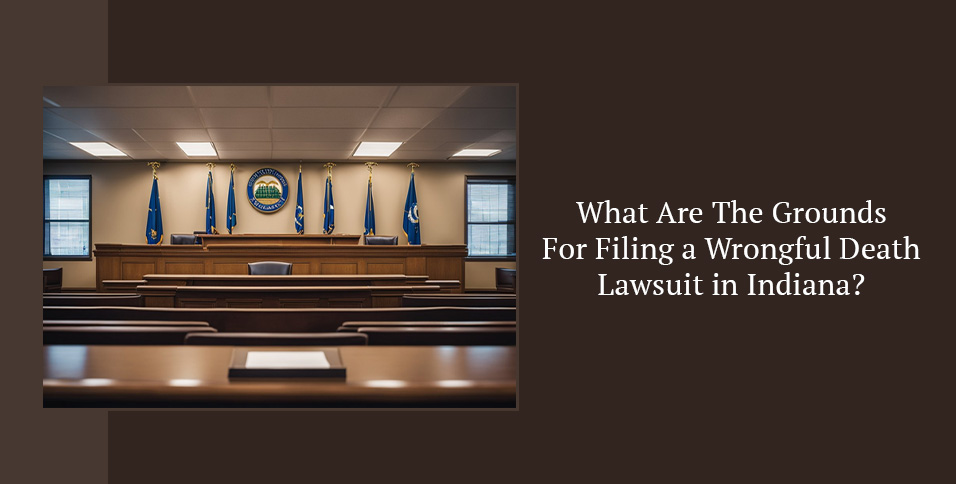When a loved one passes away due to someone else’s negligence or wrongful act, it can deeply affect those left behind in Indiana. The primary grounds for filing a wrongful death lawsuit in Indiana include negligent or intentional actions that result in the death of an individual. This could be due to medical malpractice, car accidents, defective products, or even criminal actions.
In Indiana, the personal representative of the deceased person’s estate typically files the wrongful death claim. The lawsuit aims to seek compensation for the survivors’ loss, which may include lost wages, funeral expenses, and loss of companionship. Understanding the legal framework can help guide individuals through this complex process.
Legal Foundations of Wrongful Death Claims in Indiana
In Indiana, the legal framework for wrongful death claims addresses specific criteria and eligible parties involved in filing such lawsuits. Key aspects include statutory guidelines, claimant eligibility, and distinctive legal obligations.
Understanding Wrongful Death
A wrongful death claim arises when an individual’s death results from another party’s negligence or misconduct. This action allows the deceased’s family to seek compensation for their loss. Potential compensation covers medical expenses, funeral costs, and loss of income. Emotional suffering and loss of companionship may also be considered.
Wrongful death differs from criminal proceedings. While criminal charges can occur independently, a wrongful death lawsuit targets financial recompense for the family. Consulting with legal counsel is essential to navigate complexities and establish a solid case.
Indiana Wrongful Death Act
The Indiana Wrongful Death Act governs these claims, defining conditions under which they can be filed. It specifies who may file and the types of damages recoverable. Amendments may apply based on the deceased’s age or dependents.
Statutes dictate timelines, known as statutes of limitations, typically allowing claims within two years from the death date. This timeframe emphasizes prompt action. Indiana may differentiate damages based on whether the deceased was an adult, child, or had dependents, affecting monetary recovery and claim eligibility.
Who Can File a Lawsuit?
Eligible parties ordinarily include the deceased’s personal representative. This representative can be an executor named in the will or an administrator appointed by the court if no will exists. Certain family members may also have standing, depending on the relationship to the deceased and specific circumstances.
Immediate family, such as a spouse or children, are commonly eligible to file. Parents may file for a deceased child, while other relatives might qualify based on dependency. Legal counsel offers necessary guidance on establishing standing and pursuing rightful claims, ensuring compliance with Indiana’s statutory requirements.
Key Considerations in Wrongful Death Lawsuits
Wrongful death lawsuits require careful evaluation of specific elements to ensure a compelling case. Indiana law demands attention to details like proving negligence, adhering to timeframes, and understanding compensable damages.
Proving Negligence or Misconduct
The plaintiff must demonstrate that the defendant’s actions or omissions led to the death. This often involves showing a breach in the duty of care owed. Evidence such as eyewitness accounts, surveillance footage, or testimonies plays a crucial role. In some cases, misconduct is easier to prove if the responsible party was clearly violating established protocols or laws.
Statute of Limitations
Indiana law typically requires wrongful death lawsuits to be filed within two years of the death. Failing to meet this deadline generally results in losing the right to seek damages. Exceptions might apply in special circumstances, such as when the discovery of the cause of death is delayed. It’s essential to get advice of legal counsel quickly to understand the specific timeframe for each case, as this can vary based on unique factors.
Types of Damages Recoverable
In these lawsuits, damages can cover a variety of losses. Economic damages include medical expenses, funeral costs, and the deceased’s lost wages. Non-economic damages may compensate for the loss of companionship, emotional distress, or suffering. Indiana may place caps on specific types of damages, particularly in cases involving medical malpractice. Effective legal strategy involves calculating and demonstrating these damages accurately.
Special Considerations for Jail Deaths
Jail deaths can present unique complexities in wrongful death claims. It must be shown that the death resulted from inadequate care, neglect, or misconduct by jail staff or administration. Evidence may include inadequate medical treatment, failure to monitor detainees, or violations of safety protocols. Often, these cases require a deep investigation into jail policies and practices, and obtaining cooperation from involved parties can be challenging. Understanding these challenges is vital for achieving justice in cases of jail-related fatalities.
Also Read: Top Signs You Need a Wrongful Death Lawyer Immediately
















